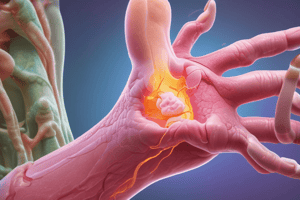Podcast
Questions and Answers
What is the main cause of gout?
What is the main cause of gout?
- Consumption of alcohol
- Overproduction of purines in the body
- High serum uric acid levels (correct)
- Consumption of a large meal
What serum concentration defines hyperuricemia?
What serum concentration defines hyperuricemia?
- Less than 6.8 mg/dL
- Less than 5.0 mg/dL
- Greater than 6.8 mg/dL (correct)
- Greater than 5.0 mg/dL
What is the initial cause for a gout attack?
What is the initial cause for a gout attack?
- Increased interleukin-1β secretion
- Deposition of sodium urate crystals
- Macrophages phagocytizing urate crystals (correct)
- Presence of free fatty acids
What triggers acute gout attacks?
What triggers acute gout attacks?
What accumulations are deposited in peripheral areas of the body with repeated gout attacks?
What accumulations are deposited in peripheral areas of the body with repeated gout attacks?
What condition may develop due to renal urate deposition?
What condition may develop due to renal urate deposition?
What are purines?
What are purines?
What affects urate levels?
What affects urate levels?
What is secreted to increase inflammation in the gout attack process?
What is secreted to increase inflammation in the gout attack process?
What exacerbates the gout attack process?
What exacerbates the gout attack process?
What is the nurse's advice regarding dietary restriction for gout patients?
What is the nurse's advice regarding dietary restriction for gout patients?
What is the importance of medication adherence for gout patients?
What is the importance of medication adherence for gout patients?
What should be encouraged for gout patients in terms of body weight?
What should be encouraged for gout patients in terms of body weight?
When is pain management with prescribed medications essential for gout patients?
When is pain management with prescribed medications essential for gout patients?
What should patients avoid to reduce pain and inflammation during a gout attack?
What should patients avoid to reduce pain and inflammation during a gout attack?
When are acute gout attacks most effectively treated?
When are acute gout attacks most effectively treated?
What is the consequence of abandoning medications and preventive behaviors between acute gout episodes?
What is the consequence of abandoning medications and preventive behaviors between acute gout episodes?
What is the nurse's advice regarding alcohol intake for gout patients?
What is the nurse's advice regarding alcohol intake for gout patients?
What is the impact of poor medication adherence on gout management?
What is the impact of poor medication adherence on gout management?
What is the recommended approach for managing gout effectively?
What is the recommended approach for managing gout effectively?
What is the most common early clinical manifestation of gout?
What is the most common early clinical manifestation of gout?
What is the recommended acute attack management for gout?
What is the recommended acute attack management for gout?
What is the main factor directly related to the development of gout?
What is the main factor directly related to the development of gout?
What is the main cause of primary hyperuricemia?
What is the main cause of primary hyperuricemia?
What is the key method for a definitive diagnosis of gout?
What is the key method for a definitive diagnosis of gout?
What may be effective in refractory chronic gout?
What may be effective in refractory chronic gout?
What is the most common joint affected by acute gouty arthritis?
What is the most common joint affected by acute gouty arthritis?
What is the main reason for the formation of tophi in chronic tophaceous gout?
What is the main reason for the formation of tophi in chronic tophaceous gout?
What is deferred until the initial gout attack according to the text?
What is deferred until the initial gout attack according to the text?
What is recommended for management between gout attacks?
What is recommended for management between gout attacks?
Flashcards are hidden until you start studying
Study Notes
Overview of Gout and Hyperuricemia
- Primary hyperuricemia can be caused by severe dieting, excessive intake of purine-rich foods, or heredity.
- Secondary hyperuricemia can result from genetic or acquired processes such as an increase in cell turnover or altered renal tubular function due to certain medications.
- Urate crystals in synovial fluid of asymptomatic joints suggest factors other than crystals may contribute to the inflammatory reaction.
- Clinical manifestations of gout include acute gouty arthritis, tophi, gouty nephropathy, and uric acid urinary calculi, with four identifiable stages of gout.
- Gout development is directly related to the duration and magnitude of hyperuricemia, and lifelong pharmacologic treatment is deferred until the initial gout attack.
- Acute gouty arthritis is the most common early clinical manifestation, often affecting the metatarsophalangeal joint of the big toe, with attacks triggered by various factors.
- Tophi in chronic tophaceous gout are associated with more frequent and severe inflammatory episodes, and higher serum uric acid concentrations lead to more extensive tophus formation.
- Medical management of gout involves a definitive diagnosis by polarized light microscopy, acute attack management with colchicine, NSAIDs, or corticosteroids, and initiation of uric acid lowering therapy after the inflammatory process subsides.
- Lifestyle changes, uricosuric agents, and corticosteroids are recommended for management between gout attacks, and pegloticase may be effective in refractory chronic gout.
- Specific treatment is based on serum uric acid level, 24-hour urinary uric acid excretion, and renal function.
- Providers tend to overestimate patient knowledge of gout, and patients prefer the use of both written and verbal materials for education, indicating a need for nurses to reinforce knowledge of gout verbally and in writing.
Studying That Suits You
Use AI to generate personalized quizzes and flashcards to suit your learning preferences.




